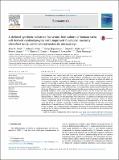A defined synthetic substrate for serum-free culture of human stem cell derived cardiomyocytes with improved functional maturity identified using combinatorial materials microarrays
Author(s)
Celiz, Adam D.; Rajamohan, Divya; Davies, Martyn C.; Alexander, Morgan R.; Denning, Chris; Patel, Asha; Anderson, Daniel Griffith; Langer, Robert S; ... Show more Show less
DownloadAnderson_A defined.pdf (1.565Mb)
PUBLISHER_CC
Publisher with Creative Commons License
Creative Commons Attribution
Terms of use
Metadata
Show full item recordAbstract
Cardiomyocytes from human stem cells have applications in regenerative medicine and can provide models for heart disease and toxicity screening. Soluble components of the culture system such as growth factors within serum and insoluble components such as the substrate on which cells adhere to are important variables controlling the biological activity of cells. Using a combinatorial materials approach we develop a synthetic, chemically defined cellular niche for the support of functional cardiomyocytes derived from human embryonic stem cells (hESC-CMs) in a serum-free fully defined culture system. Almost 700 polymers were synthesized and evaluated for their utility as growth substrates. From this group, 20 polymers were identified that supported cardiomyocyte adhesion and spreading. The most promising 3 polymers were scaled up for extended culture of hESC-CMs for 15 days and were characterized using patch clamp electrophysiology and myofibril analysis to find that functional and structural phenotype was maintained on these synthetic substrates without the need for coating with extracellular matrix protein. In addition, we found that hESC-CMs cultured on a co-polymer of isobornyl methacrylate and tert-butylamino-ethyl methacrylate exhibited significantly longer sarcomeres relative to gelatin control. The potential utility of increased structural integrity was demonstrated in an in vitro toxicity assay that found an increase in detection sensitivity of myofibril disruption by the anti-cancer drug doxorubicin at a concentration of 0.05 μM in cardiomyocytes cultured on the co-polymer compared to 0.5 μM on gelatin. The chemical moieties identified in this large-scale screen provide chemically defined conditions for the culture and manipulation of hESC-CMs, as well as a framework for the rational design of superior biomaterials.
Date issued
2015-05Department
Massachusetts Institute of Technology. Institute for Medical Engineering & Science; Harvard University--MIT Division of Health Sciences and Technology; Massachusetts Institute of Technology. Department of Chemical Engineering; Koch Institute for Integrative Cancer Research at MITJournal
Biomaterials
Publisher
Elsevier
Citation
Patel, Asha K., Adam D. Celiz, Divya Rajamohan, Daniel G. Anderson, Robert Langer, Martyn C. Davies, Morgan R. Alexander, and Chris Denning. “A Defined Synthetic Substrate for Serum-Free Culture of Human Stem Cell Derived Cardiomyocytes with Improved Functional Maturity Identified Using Combinatorial Materials Microarrays.” Biomaterials 61 (August 2015): 257–65.
Version: Final published version
ISSN
01429612
1878-5905